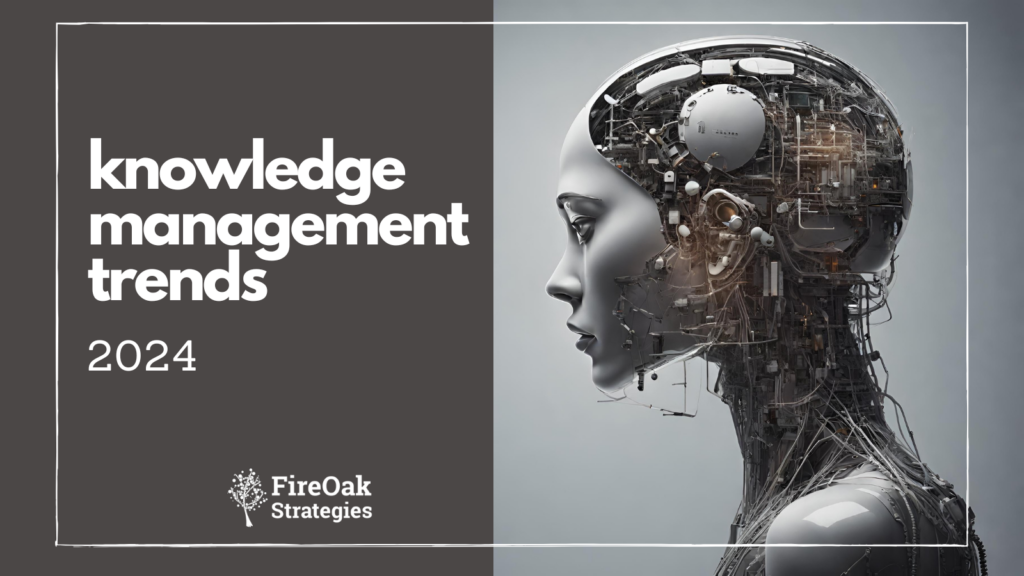As 2024 gets underway, the field of Knowledge Management (KM) continues to evolve at an unprecedented pace, driven by technological advancements, shifting workplace dynamics, and the ever-increasing value of intellectual capital in the corporate world. This year, we are witnessing transformative trends in KM that are not just reshaping how organizations capture, manage, share, secure, and utilize knowledge, but are also redefining the very fabric of organizational learning and collaboration. In this article, we delve into the top knowledge management trends of 2024, exploring how these developments are revolutionizing the way businesses operate and compete. From the integration of cutting-edge technologies like AI and machine learning to the emergence of more sophisticated and collaborative knowledge-sharing cultures, these trends are paving the way for more dynamic, efficient, and innovative approaches to knowledge management.

Jump to specific Knowledge Management trends:
- AI-Powered Knowledge Management
- Unified Knowledge Ecosystems
- Revolutionizing Retrieval: Advanced KM Search
- Agile Knowledge Creation & Innovation
- Analytics-Driven Knowledge Strategies
- Future-Proofing Knowledge: Advanced Archiving and Retention
- Integrating Security & Knowledge Management
- The Rise of Employee-Centric KM
- KM in the Metaverse: Exploring New Realms
- Green Knowledge Management: Sustainability in Focus
Knowledge Management Trends in 2024
AI-Powered Knowledge Management
Artificial Intelligence (AI) has permeated the realm of Knowledge Management (KM). AI tools are now instrumental in automating content analysis, enhancing knowledge retrieval, accelerating the production of new knowledge, and providing predictive insights. This trend sees AI not just as a tool but as an integral partner in managing organizational knowledge. For instance, the use of natural language processing enables more intuitive search capabilities, while machine learning algorithms can surface hidden patterns and connections within vast data sets. This integration of AI is revolutionizing how knowledge is created, curated, accessed, discovered, and utilized, paving the way for smarter, more efficient KM practices and exciting new ways to leverage existing organizational knowledge.
Unified Knowledge Ecosystems
The evolution from standalone KM systems to integrated knowledge platforms marks a significant shift towards more cohesive and user-friendly knowledge environments. Platforms like SharePoint Online are being leveraged to create centralized knowledge hubs that integrate seamlessly with other workplace tools. This integration facilitates a more unified experience, where knowledge sharing becomes a natural part of daily workflows. By breaking down silos and centralizing knowledge, these platforms enhance collaboration, accessibility, and efficiency. They also enable organizations to leverage their existing infrastructure, making KM more cost-effective and scalable.
Revolutionizing Retrieval: Advanced KM Search
The reliance on advanced search technologies is redefining the way knowledge is accessed and utilized. The focus has shifted from extensive tagging and categorization to developing enriched search functionalities that can intelligently parse through content. Enhanced by AI, these search tools understand context and semantics, delivering more accurate and relevant results. This shift reduces the time and effort required to manage knowledge bases and empowers users to find the information they need quickly, enhancing productivity and decision-making.
On the other hand, enriched search capabilities doesn’t discount the need to maintain a reasonable level of content organization. AI tools such as Microsoft Copilot will provide far better insights, answers, and support if content has been reasonably maintained, avoiding “ROT” – i.e., Redundant, Outdated, and Trivial data. Search is only as good as the data it is indexing.
Agile Knowledge Creation and Innovation
The concept of agile knowledge development cycles is emerging as a key trend, bridging the gap between KM and innovation. In this approach, the creation and dissemination of knowledge are accelerated to keep pace with rapidly changing market demands. This agility fosters a culture of continuous learning and collaboration, crucial for innovation. By implementing agile methodologies in KM, organizations can quickly adapt their knowledge base, ensuring it remains relevant and valuable. This trend underscores the importance of KM in supporting organizational adaptability and driving innovative practices.
Analytics-Driven Knowledge Strategies
Embracing data analytics is central to modern KM strategies. This trend involves leveraging data to inform and optimize KM practices, from personalizing knowledge delivery to measuring the effectiveness of KM initiatives. Analytics provide insights into how knowledge is being used within the organization, enabling more informed decisions about content development and knowledge sharing. This data-driven approach ensures that KM activities are aligned with organizational goals and are responsive to user needs, leading to a more effective and impactful KM strategy.
Future-Proofing Knowledge: Advanced Archiving and Retention
In the digital age, effective archiving and data retention are pivotal for future-proofing organizational knowledge. With the exponential growth of data, businesses are increasingly focusing on strategies for efficient storage, retrieval, and archiving of knowledge. Cloud-based solutions are at the forefront of this trend, offering scalable and secure options for storing vast amounts of data. These solutions facilitate easy access and retrieval of archived knowledge, ensuring that valuable insights from the past remain accessible and useful. Additionally, organizations are placing a stronger emphasis on compliance with data protection regulations, recognizing the importance of responsible and secure data handling in maintaining trust and integrity.
Integrating Security and Knowledge Management
The intersection of information security and KM has – and continues to be – more pronounced, reflecting a growing understanding that securing knowledge is a hugely important component of managing it. This trend involves developing strategies that directly connect KM and cybersecurity, ensuring that knowledge assets are protected against evolving digital threats. Organizations should be implementing robust access controls, encryption, and regular security audits across all systems that manage, store, or transmit organizational knowledge.
Additionally, there’s an emphasis on educating employees about security best practices, recognizing that human factors play a crucial role in information security. By closely aligning KM and security practices, organizations can safeguard their intellectual capital while fostering a culture of security awareness.
The Rise of Employee-Centric KM
Employee-centric KM approaches are gaining momentum, recognizing that the user experience is key to effective knowledge sharing and utilization. Personalized knowledge feeds, user-friendly interfaces, and recommendation systems are becoming standard features of KM systems. These tools are designed to cater to individual preferences and working styles, making it easier for employees to engage with and contribute to the knowledge base. Such customization enhances user satisfaction and drives higher adoption rates, ultimately leading to more effective and widespread knowledge sharing within the organization.
KM in the Metaverse: Exploring New Realms
The potential of virtual reality (VR) and augmented reality (AR) technologies in KM is an exciting frontier. The metaverse offers immersive environments for training, simulations, and collaborative workspaces, transcending physical boundaries. These technologies enable more engaging and interactive learning experiences, making complex knowledge more accessible and understandable. As these technologies continue to mature, their integration into KM strategies represents a significant leap forward in how knowledge is experienced and shared.
Green Knowledge Management: Sustainability in Focus
Sustainability is increasingly becoming a key consideration in KM practices, termed as ‘green’ KM. Green KM involves implementing practices that minimize the environmental impact of KM activities, such as reducing paper usage and optimizing digital storage to consume less energy. Additionally, KM systems are being used to promote and disseminate sustainable practices within organizations, reinforcing the commitment to environmental responsibility. This trend reflects a broader shift towards more socially responsible and sustainable business practices, with KM playing a crucial role in driving this transformation.
Knowledge Management Trends: Now What?
These knowledge management trends collectively represent the cutting edge of KM in 2024, showcasing a field that is continuously evolving to meet the challenges of a complex and rapidly changing world. Each trend highlights the innovative ways in which knowledge is being managed, secured, and leveraged to drive organizational success and sustainability.
Embracing these developments is not just about keeping pace with technological advancements; it’s about actively shaping a future where knowledge is a key driver of innovation, efficiency, and sustainable growth. By adopting these trends, organizations can unlock new potential, foster a culture of continuous learning, and build a robust foundation for future success.






